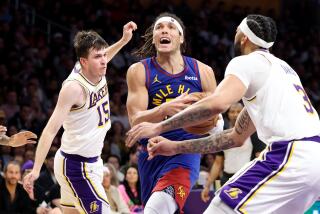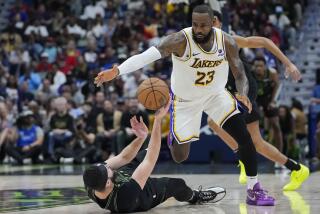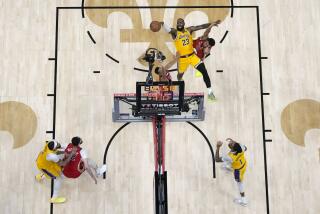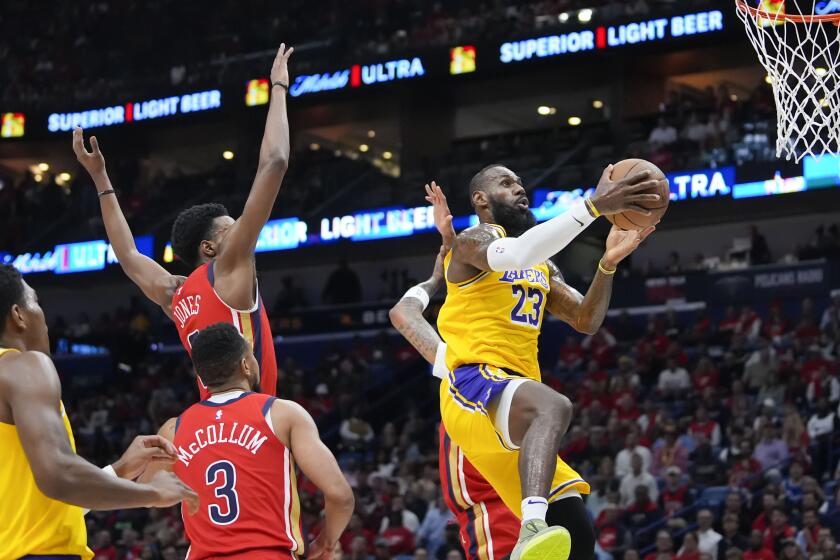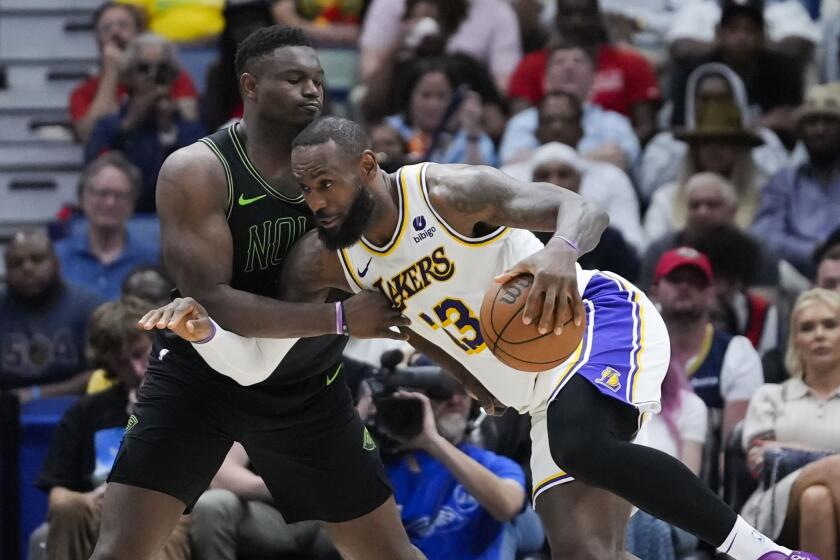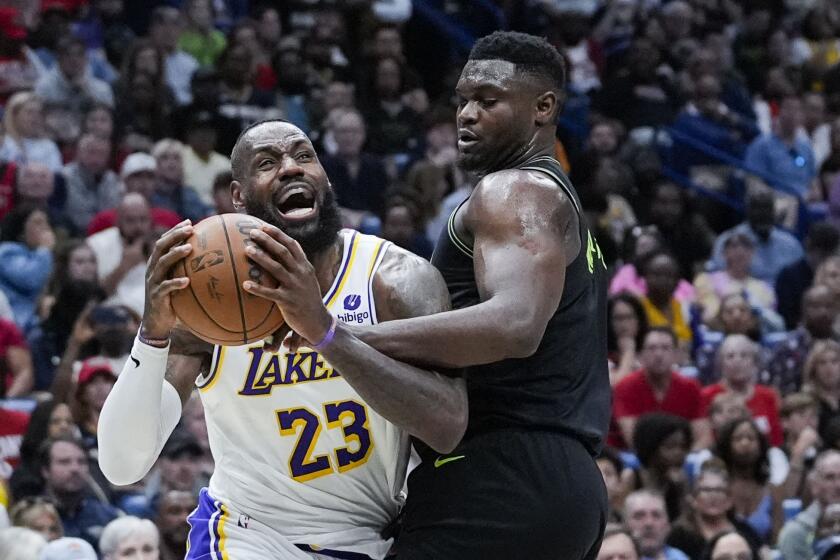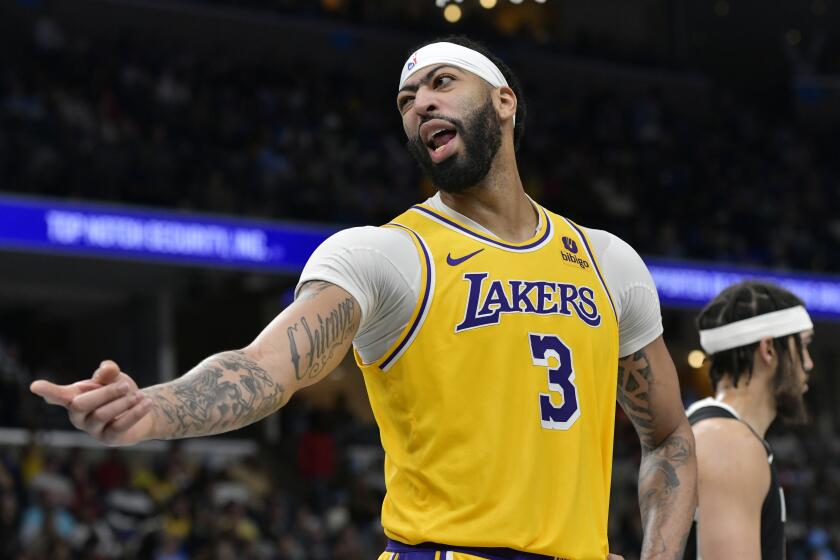A MERRIER MAY
Bringing it all back home . . . home?
It’s almost 12 years since Kobe Bryant became a Laker and he’s been ours all that time.
Ours to dazzle, ours to try with his youthful exuberance, ours to horrify as we watched his fall, ours to shock as he threw the Lakers’ organization under the bus.
Mostly he was ours to amaze as he lurched from crises of his own invention to triumphs no one could have imagined months before.
Of course, being Bryant, it would be on to the next crisis, which even he looked like he couldn’t get out of this time. . . .
Like this piece de resistance, going from last May’s days of rage to this Wednesday in May when Commissioner David Stern or one of his lieutenants will hand him his first MVP trophy.
How many of the fans who’ll be chanting “MVP!” booed Bryant on opening night last fall?
However many there were, they will have been entitled in both cases.
Given Bryant’s greatness and dedication, this starry night is the way it should have been all along . . . and the way it still could be.
He was just emerging from Shaquille O’Neal’s shadow when Shaq was traded. Bryant got the blame, although it was entirely mutual with each ready to leave the other.
As Bryant later acknowledged, he thought he was going, too, to the Clippers. For years it looked as if he should have and saved himself a world of grief.
In the depths of the Lean Years from 2004 to 2007, Bryant discovered something new: fear.
Once serenely confident of achieving his goals, he felt abandoned and reviled -- “an outcast my entire life,” he wrote for Dime Magazine -- “[always] made to feel like there was something wrong with wanting to win so badly and wanting to become the best at what you do.”
Happily for Bryant, laying siege to the Lakers’ organization from last May to October didn’t get him traded to Chicago, which might have cast him into mediocrity forever.
Now his career lays out perfectly, on a rising power that should only be better when Andrew Bynum returns, with everything -- multiple MVPs, multiple titles -- possible.
For all Bryant’s mistakes and all his luck, this isn’t anything anyone gave him.
Only a few players were ever as gifted and not even Michael Jordan matched Bryant’s 24/7/365 commitment. The hardest off-season workout Jordan ever put in would be Bryant’s average.
“He’s not going through the motions when he’s shooting jump shots,” Canada national team assistant coach Jay Triano told the Toronto Star of Bryant’s workout in an empty gym after a practice at last summer’s Olympic qualifying tournament.
“They’re game shots at game speed. And the repetitions over and over and over. . . . You’d think he’d be done and he’s going on to the next spot. And he goes back and he shoots fade-aways and he shoots ‘em off the bounce.
“I was just like, ‘Holy smoke.’ You get tired throwing the ball back, let alone shooting it.”
The big question is: Who is Kobe Bean Bryant now?
The truth is, he was never ours, nor are any of our sports heroes.
They’re all their own and none more than Bryant, whom so few would ever know at all, and fewer as time went on.
Utterly a creature of his family, still living with his parents when he arrived, he’s now utterly a creature of his own family and hired retainers in Newport Beach, a formidable commute from Staples Center.
The closer you were, the more likely he was to turn his back on you as he did with Sonny Vacarro, the sneaker maven who was his first mentor, and agent Arn Tellem, who brought him to then-Lakers general manager Jerry West.
Bryant’s face is unlined and his confidence intact, if not unshaken, but he has scars that don’t show, like the Eddie Murphy character in “Trading Places” who proclaims, “Karate man bruise on the inside!”
Bryant still doesn’t speak to some Lakers officials and has only tentatively signaled a thaw in his relationship with owner Jerry Buss.
When a chipper Bryant recently joked about GM Mitch Kupchak going from “F to A-plus,” his comments about Buss were polite, lacking enthusiasm, much less any acknowledgment that Kobe, himself, did anything wrong.
It’s not that Buss was good to Bryant. Bryant made Buss hundreds of millions of dollars so anything Buss gave him, Kobe earned that too.
On the other hand, Buss was good to Bryant, recognizing him as Showtime Personified from his arrival at 17, favoring him above all others, even O’Neal.
Rather than put the blame for O’Neal’s departure on Bryant, as Kobe charged last spring, the owner always took personal responsibility.
Rather than mislead Bryant about his commitment while building for the future with Bynum, Buss’ organization created a future where none existed.
Rather than humor Bryant, they didn’t trade Bynum for Jason Kidd, who, great as he is, wasn’t the answer in Dallas where the Mavericks ran isolation plays and wouldn’t have been the answer in the triangle offense’s two-guard front.
Rather than cut costs, Buss, who already had a team that could contend for years with Bryant and Bynum, took on a commitment that could reach $96 million in salary and luxury tax the next three seasons to get Pau Gasol.
(Not that that was an act of charity either. Who do you think will pay that tab?)
(You, that’s who.)
Bryant wasn’t alone in his suspicions. In the Lean Years, a lot of people in the organization thought Buss was cutting costs to save for his estate tax bill.
Phil Jackson once even mentioned it. I told him that wasn’t the way I saw Buss. “Then,” I noted, “there’s your $10-million salary.”
Finally, despite Bryant’s personal attack, Buss never stopped hoping he would stay, even if he wavered in Honolulu last fall, saying he would “definitely” listen to trade offers.
When Bryant took that as yet another betrayal, demanded to be traded anew and to participate in the process while sitting out three days of practice the week before the opener, events seemed to be tumbling out of control.
You wouldn’t think they could have gotten here from there, but here they are.
Bryant, asked daily about last spring’s meltdown, suggests, however whimsically, that it had its pluses (“It takes pressure sometimes to make a diamond”).
It’s understandable. It’s just not enough, or even close.
The Kobe Bryant who started on this journey had some ability to figure out when he was wrong, although it was never the thing he did best.
What he always did best was be a totally stand-up guy when he realized he was wrong. It’ll be interesting to see if that Kobe survived.
--
More to Read
All things Lakers, all the time.
Get all the Lakers news you need in Dan Woike's weekly newsletter.
You may occasionally receive promotional content from the Los Angeles Times.
